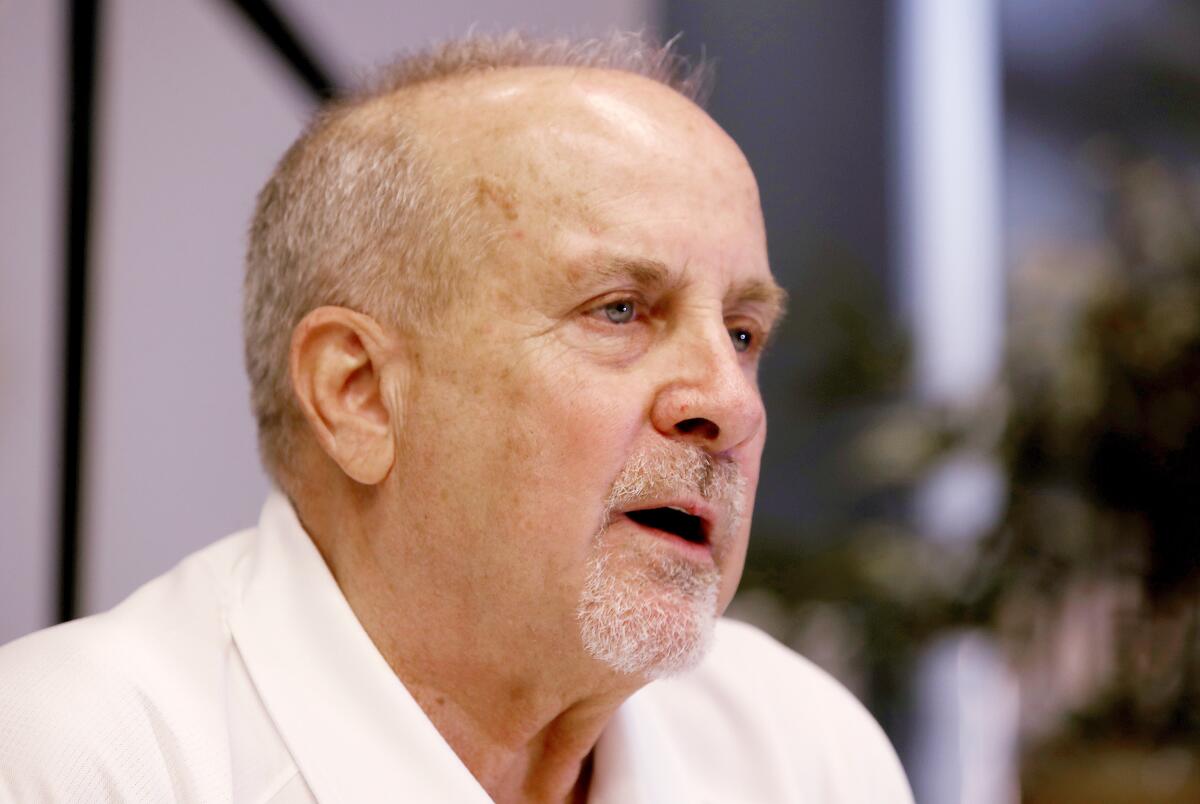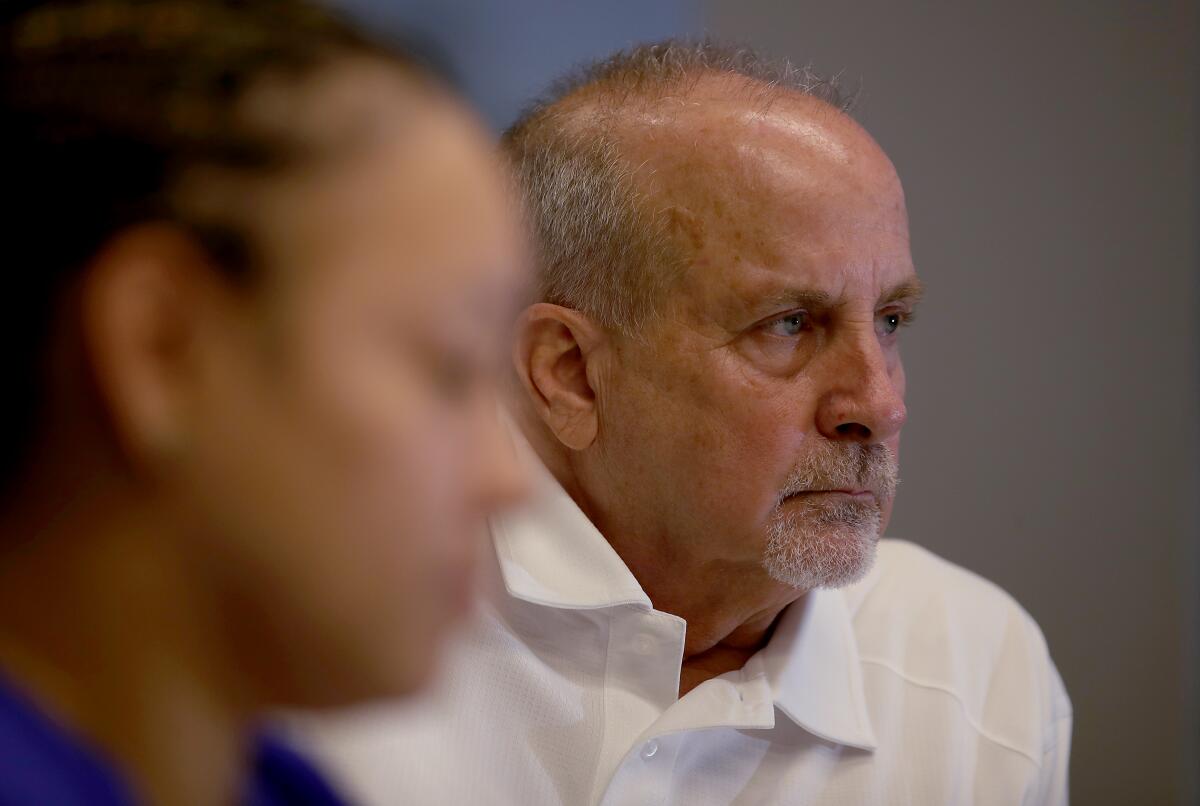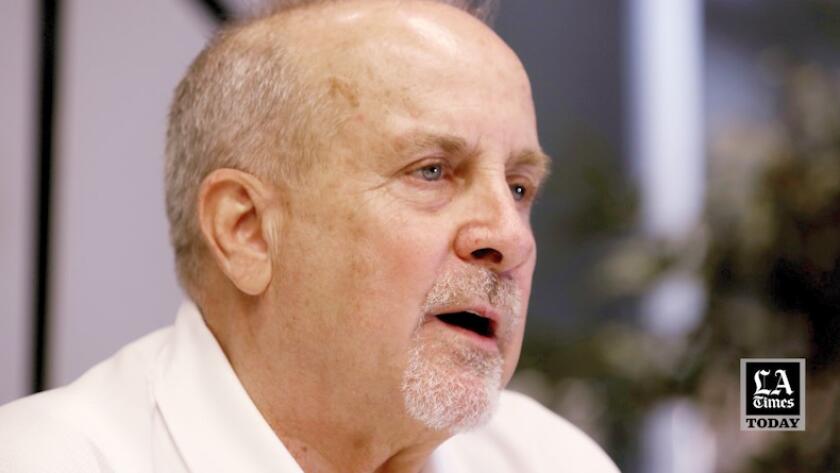He went from running the Dodgers to fighting sex trafficking

- Share via
Silvia King was 15 when someone pitched her on a chance at a richer life. King’s family was poor, and here was a woman telling her she could go on a trip and make enough money to take care of herself and her mother.
Amid the futility and monotony of high school in Gardena, change was an enticing proposition. She did not know where she would go, or what she would do when she got there.
“I was like, ‘Cool, I have an opportunity. I’m not going to miss it. I’m going to help my family,’ ” King recalled. “That was the goal.”
King was put on a Greyhound bus, bound for Texas and the sex traffickers who would move her from hotels to salons to tract homes.
“I just told my mom I was going out for the day, and then she never saw me for a month,” King said.
The man seated across the room from King nodded as she told her tale. They had gathered at Inner City Visions, an nonprofit organization in South Los Angeles whose community activities include restoring the lives of those forced to become sex workers.
“People talk a good game,” the man said. “People act like they are doing stuff, because they get money and they want to say they are helping people. But these guys here are actually doing the work.”
He is the man who helped turn this place from vision into reality, a self-described warrior in the fight against sex trafficking. He is the leading the NFL anti-trafficking initiative at the Super Bowl.
He is the guy who used to run the Dodgers.
::
The Dodgers hired Kevin Malone as general manager in 1998. They had not won a playoff game in 10 years, but the team was bankrolled by Rupert Murdoch. Malone signed pitcher Kevin Brown to the first $100-million contract in baseball history, and the chorus from what Malone called “Dodger haters” sung out loud and clear.
John Moores, owner of the San Diego Padres, bashed the Dodgers for acting “like they’re only interested in their own self-interest.” Sandy Alderson, now president of the New York Mets and then baseball’s executive vice president, ripped Malone’s statements about concern over payroll disparity as “an affront and an insult to the commissioner of baseball.”
Dodgers outfielder Cody Bellinger is pleased with his health and offseason routine as he prepares for the season while enjoying his newborn daughter.
Payroll disparity was a feature, not a bug, of the system negotiated between owners and players. He worked within the system in a previous job as general manager of the Montreal Expos, stripping the team of four of its most valuable players in three days. The Expos’ ownership claimed it could not afford to pay them.
Malone could acknowledge the industry-wide challenge of payroll disparity, but his job obligated him to leverage the Dodgers’ cash advantage, not sacrifice it.
“To me, it’s just sour grapes,” Malone told The Times in 1999. “Everyone is jealous of the Dodgers.”
That was not the only time Malone spoke plainly. He publicly challenged the Dodgers’ manager, Davey Johnson. When Malone took over the Dodgers, he announced there was a “new sheriff in town.”
The Padres mocked Malone, with Moores, general manager Kevin Towers and manager Bruce Bochy posing in Western gear for the cover photo of the team’s media guide. Times columnist T.J. Simers relentlessly goaded Malone as “Dodger Boy,” after Malone said in a radio interview he would take that as his nickname.
In 2001, after a fan taunted Malone in San Diego, the fan said Malone suggested a fight. That was enough for the Dodgers, and Malone was asked to resign.
“He does have a tendency to put his foot in his mouth,” Dodgers chairman Bob Daly said then. “I’m disappointed that these things kept happening.”
Malone went from being on top of the baseball world to being exiled from it. Two decades later, at 64, he reflected on how the focus of his life changed from winning games to saving lives, with two photographers in the room.
“I don’t think I’ve had that since I got fired by the Dodgers,” he said.
::
Alfred Lomas met Malone at the Dream Center, a Los Angeles organization that describes its mission as renewing hope and rebuilding lives. The Dream Center was holding a come-one, come-all Christmas dinner. Malone and his family handed out Bibles, and he did not leave until he had shaken hands with everyone.
“What in the world,” Lomas said he wondered that night, “is this guy doing here with a bunch of drug addicts and throwaways?”
It would make for a tidy story line to say Malone found religion after the Dodgers dumped him, but it would not be true. He attended church when he ran the Dodgers, spoke to church groups, invited pastors to join him in his suite. In his final days with the Expos, he told a Christian magazine that baseball had been so consumed by power, money and greed that the game was “controlled by Satan.”
When he played baseball at the University of Louisville, his nickname was “Hog.” In his junior year he decided the Bible should be something he lived, not just something he read. His teammates took note of the transformation.
“They started calling me ‘Holy Hog’ or ‘Reverend Hog,’ ” Malone said.
Bob Graziano, the Dodgers’ president when Malone was ousted, had suspected Malone would find a job with another major league team. The sport is full of high-profile executives fired by one team and hired in some capacity by another.
“I thought he would stay in baseball,” Graziano said, “just because he was so passionate about it.”
He was, but the sudden time off made him realize how running a baseball team can seem to require eight days a week, 25 hours a day. There always was a call to make, a meeting to take, a player to call up or send down, bring in or ship out. He could never feel as if he had done enough.

In his two full seasons with the Dodgers, the team finished 23 games out of first place the first year, 11 games out the next.
Perhaps there could be more to life than “Kevin Malone, general manager.” He bought an ownership stake in a Mercedes-Benz dealership in Valencia. He raised money for The Master’s University, a Christian college in Santa Clarita. He pitched in at the Dream Center.
He attended Cornerstone Church in Simi Valley, where he befriended Francis Chan, then the pastor there.
“I mostly knew him through beating him at golf every other week,” Chan said.
The epiphany, or at least as close to one as Malone had, came when he joined Chan on a visit to Thailand. The men worked with girls who had been rescued from sex traffickers, some barely into their teens.
“He and I both had daughters, and there’s that man side of you that says you just want to kill someone” for forcing girls into sex work, Chan said. “But then there’s the other side that realizes we have to do everything we can with our resources, with our platforms, to make people aware.”
Malone, who had lost his most visible platform, was about to undertake his most important work.
“The thing I appreciate about him is, a lot of times, people in the church will nod their heads, or even cry, but then their lives don’t change,” Chan said. “For Kevin, he really just rearranged his priorities and started centering his life around rescuing these girls.”
Lomas, a former gang member who had worked on a variety of community intervention initiatives over the years, wanted to start his own program, in his old neighborhood. That turned out to be Inner City Visions, and Malone helped make it happen, as a fundraiser, business mentor, and friend.
“He gave me something no one else had given me,” Lomas said. “He gave me a chance.”
In turn, Lomas and his team gave King a chance. Her path to Inner City Visions was tortuous.
He gave me something no one else had given me. He gave me a chance.
— Alfred Lomas, former gang member
One day in Texas, her traffickers allowed her to walk outside, under supervision, to an adjacent 7-Eleven. She noticed a man in a car, staring at her. King walked back, and soon her traffickers said someone had bought a sex session with her. It was the man in the car.
The man, she discovered, was there to rescue her. But after King returned to L.A., she started dating a man who turned out be a trafficker. She left him and got into a program that offered food, shelter and therapy.
She ran away from the program, in search of freedom, and another trafficker found her. Four years ago, she came to Inner City Visions on Florence Avenue. As she told her story there, her two toddler girls — ages 3 and 1 — gleefully offered to share toys and juice boxes.
At the center, everyone asks how she is doing, if she needs child care during a medical appointment or job interview, when she would like a ride home.
She is 28 now. Real estate could be in her future, or case management, or writing a book about her experiences, or maybe opening a restaurant with her mother. She can dream, at least.
“I’m not where I want to be, but I’m somewhere better than where I was a year ago,” she said. “I don’t think I even knew what my son’s favorite food was.”
It’s chicken alfredo. To get the support she needed to remain off the streets long enough to care for her kids and learn their palates, she has this safe place.
::
In 2016, after traveling across the country to explore who was fighting sex trafficking and how, and after launching an advocacy group on his own, Malone co-founded the nonprofit, faith-based U.S. Institute Against Human Trafficking.
In addition to working with community leaders, elected officials and law enforcement to prevent and combat trafficking, the institute operates a Florida home for boys victimized by sex traffickers. According to the nonprofit Polaris Project, 7.5% of sex trafficking cases reported in 2020 involved male victims.
In 2019, then-President Trump appointed Malone to a task force of 11 experts charged with advising federal agencies and Congress on how to improve anti-trafficking programs and policies. In 2020, he participated in a White House summit on the issue.
In baseball, the White House visit is the pinnacle for a World Series championship team. Malone never made it there with the Dodgers, but he got there in his own way.
::
The link between the Super Bowl and sex trafficking is pervasive enough that elected officials and law enforcement representatives highlight it before the big game each year, even as researchers largely consider the evidence for such a link to be anecdotal and apocryphal.
Nonetheless, since 2015, the NFL has asked each Super Bowl host committee to organize anti-trafficking efforts and has provided an undisclosed amount of financial support for those efforts.
“We are proud to work with host committees every year to identify the best ways to support trafficking prevention and education in their communities,” said Anna Isaacson, NFL senior vice president of social responsibility.
Kathryn Schloessman, chief executive of the Los Angeles Super Bowl host committee, turned to Malone, who assembled a coalition of local and national organizations.
“He’s putting together a strategy for all the major events we have coming over the next decade,” she said. “It’s not just a one and done.”
Those events include baseball’s All-Star game this year at Dodger Stadium, college football’s national championship next January at SoFi Stadium and the Olympics in 2028.
“This is not a Super Bowl problem,” Malone said. “This is a major event problem, wherever groups of men gather. It could be NASCAR. It could be a boxing match in Vegas, or a business convention.”
The scope of America’s sex trafficking problem is difficult to determine, but those legitimately fighting it can be undermined by estimates so wildly exaggerated and repeated on social media — thousands of victims every year, and those are just the abducted kids! — that The Atlantic headlined its look at the phenomenon as “The Great (Fake) Child-Sex-Trafficking Epidemic.”
The Polaris Project, which operates the federally funded U.S. National Human Trafficking Hotline, reported contact with 11,467 likely victims of sex trafficking in 2020, including 1,068 in California. Most were adults. The estimate probably is low, but no more authoritative data exists. Polaris reported 81% of the victims were trafficked by a family member or recruited by an intimate partner or marriage proposal.
Oree Freeman, a trafficking survivor turned advocate, softens no words in explaining their plight.
“I know what it’s like to lay on my back and be raped seven to 15 times a night,” she said.
Freeman said she entered juvenile hall at 11 and was trafficked over the next five years. She trusts Malone to do his part, and to trust her to do hers, to disrupt what she called the “school-to-prison pipeline” over generations. Freeman’s own mother gave birth to her at the women’s state prison in Chowchilla.
“I was born with a booking number,” she said.
When she met Malone, Freeman had no idea he had run the Dodgers. In him, she did not see a famous sports executive. In him, she said, she sees someone who helps people, someone who believes everyone has something to give to the world.
In him, she sees hope.
- Share via
Watch L.A. Times Today at 7 p.m. on Spectrum News 1 on Channel 1 or live stream on the Spectrum News App. Palos Verdes Peninsula and Orange County viewers can watch on Cox Systems on channel 99.
More to Read
Go beyond the scoreboard
Get the latest on L.A.'s teams in the daily Sports Report newsletter.
You may occasionally receive promotional content from the Los Angeles Times.











